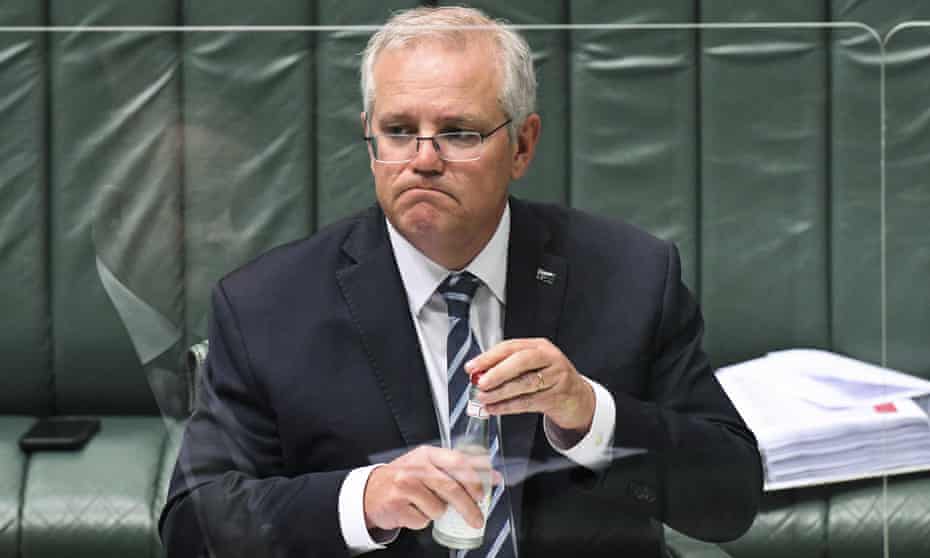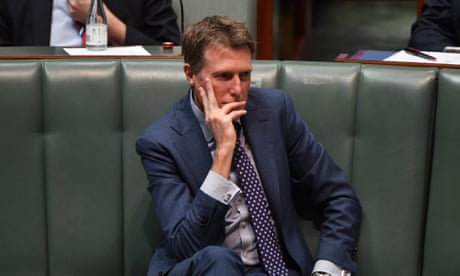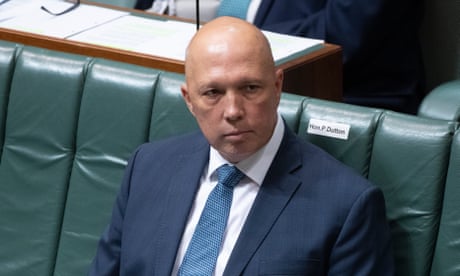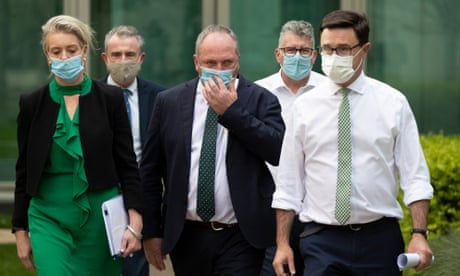Extract from The Guardian
With Glasgow around the corner and an election in sight, the prime minister could’ve done without this week’s privileges committee fracas.

Last modified on Sat 23 Oct 2021 06.01 AEDT
Funnily enough, the most explosive drama of the week was not Liberals and Nationals facing off about the net zero target. That bullfight had been long scheduled.
The lesser-known fracas inside the government unfolded shortly after it used its numbers in the House of Representatives to quash Labor’s bid to refer Christian Porter’s use of a blind trust to pay legal fees to the privileges committee.
The Speaker of the House, Tony Smith, had agreed there was a “prima facie case” Porter should be investigated for a possible breach of disclosure rules. But the government voted down the referral. Labor promptly picked up the bullhorn and declared this was the first time that had happened since federation.

Taking their cue from Labor about the breach of parliamentary convention, some Liberal backbenchers were completely horrified about what had just happened. Just after the vote, about 20 Liberals huddled outside the chamber. Hackles were raised. The general disposition was “what the hell has just happened” and “why wasn’t this explained to us” and “how do we explain to our constituents why we voted this way”.
The next morning, the manager of government business in the House, Peter Dutton, used his daily briefing to backbenchers about the day’s business in parliament to quell a minor insurrection. Dutton explained the privileges committee would examine the circumstances around Porter and the trust – that this was a given. He said Labor had already sent that issue to privileges committee.
The moral of the story is some in the government are getting sick of waiting, like obedient preschoolers, for basic things to be communicated to them. But this weekend, there is yet more waiting. Liberals will be sweating on what Morrison and the Nationals leader will be cooking up on net zero, hoping that the landing point isn’t terrible.
For the last few weeks, Canberra’s political ecosystem has been minutely focused on what it will take to land an agreement between Morrison and the Nationals on a net zero by 2050 emissions reduction target.
Will it be a taxpayer funded coal plant? A fleet of modular nuclear reactors? A $3bn extension of the inland rail project to Gladstone? A $250bn taxpayer funded financing facility for new fossil fuel projects? A jobs guarantee for displaced coal workers? A safety valve mechanism that would allow Australia to walk away from a net zero commitment in the event things went south in the regions?

As he’s hinted periodically through the week, Morrison doesn’t actually have to give the Nationals anything. This decision will be made by the cabinet, and in the cabinet, a clear majority favours net zero. People around Morrison say the prime minister will certainly not countenance the safety valve idea championed by the Nationals minister Bridget McKenzie. Reviews tracking progress and outcomes, absolutely. Opting out of the commitment, not so much.
For all the piquant hints about cabinet (and not Nationals backbenchers) being the decision maker, Morrison does want to land a consensus with Joyce, because with an election in sight, and things already a bit fractious, peace in the Coalition is preferable to war.
By Sunday, there should be a clear sense of the what. But equally important is the why. Why does Morrison want this climate policy pivot, and what does he plan to do with it?
Because this is Morrison – the most research driven prime minister I’ve covered – we need to start with the polling. When the government’s net zero discussion kicked off in the leadership group earlier this year, it opened with Crosby Textor research. I’ve heard diametrically opposed versions of what this research says, but I’m confident the summary I’m about to share is the correct one.
Some Australians are profoundly motivated by climate action, and others think global warming is a complete crock. This is a statement of the obvious. The relevant cohort for Morrison’s purposes is the people in the middle, in the marginal seats that decide the outcome of elections.
For this group, climate action doesn’t rank high in their list of personal priorities. But this changes if voters are prompted. When prompted, voters say climate change is enough of a threat to warrant their government taking out policy insurance. In many respects, climate change is analogous with defence. Defence rarely features prominently in a list of voter priorities. But if people are prompted – pretty much everyone wants Australia to be defended against external threats.
In marginal seats, climate is a proxy for competence.
The research indicates voters are very conscious that the physical world is changing, and they want to conserve the things they value. People are aware there is an international conversation under way about combating the threat of runaway global heating (although there’s limited fluency with the terms of art – targets, policy mechanisms and so on). Voters don’t want Australia to be left behind in the transition.

So this is the starting point of the political problem Morrison is attempting to fix. In marginal seats, climate is a proxy for competence.
Apart from the research, the other issue flagged during the early internal conversations about the climate pivot was the disposition of major allies. The United States and the United Kingdom want Australia to take ambitious action, which is why the prime minister attempted to land not only net zero, but also internal agreement to a marginally higher 2030 target as well. But on 2030, the Nationals were a hard no.
Some Liberals think Morrison could go to the coming election promising a higher 2030 target. Anything is possible, but right at the moment, that feels like a triumph of hope over experience. Having all-but secured his 2050 reboot, the prime minister is already racing down the path of product differentiation with Labor.
Morrison was trialling new lines in the parliament this week. Climate change was about economic management, and who do Australian voters trust more to manage the economy? The Coalition would have a 2050 target and a technology-driven roadmap to get there, while Labor remained the wild-eyed tax merchants – never mind the inconvenience that taxes (as opposed to polluters) fund the Coalition’s current abatement mechanisms, and taxpayers will be underwriting or directly funding the technology strategy.
Just in case my point isn’t clear: “technology not taxes” is a conceptual nonsense that can be blown over by the slightest puff of wind. Also nonsense: the idea you have a credible long-term emissions reduction strategy without short-term ambition (and the policy mechanisms to deliver it).
If Morrison doesn’t promise a new 2030 target, Labor will go to the voters with a higher medium-term target than the Coalition, which seems certain to trigger a new round of weapons-grade mendacity in the parts of the country where mendacity has proved an election-winning strategy.
When Morrison goes to Glasgow at the end of next week, he will be flying into an international climate conference where net zero is a given, and all the action is around ambition ahead of 2030 – because that’s what the science and the economic imperatives demand. While a measurable gap between Australia and the world portends more diplomatic embarrassment, back home in regional Queensland, the Coalition will attempt to use the hubbub to tell voters we are pragmatic about this transition rather than letting Big Green push us around.
But three years on from the absolute travesty that was the “war on the weekend”, Morrison can’t bank on another election victory predicated on a set of glib slogans that speak only to voters in the regions. The Liberal party is under pressure in its metropolitan heartland.
With the current grand bargain, the prime minister is trying to hedge his bets. Morrison will be hoping he emerges from this messy process with climate neutralised both in the city and the regions.
But as they say in the classics – only time will tell.
No comments:
Post a Comment